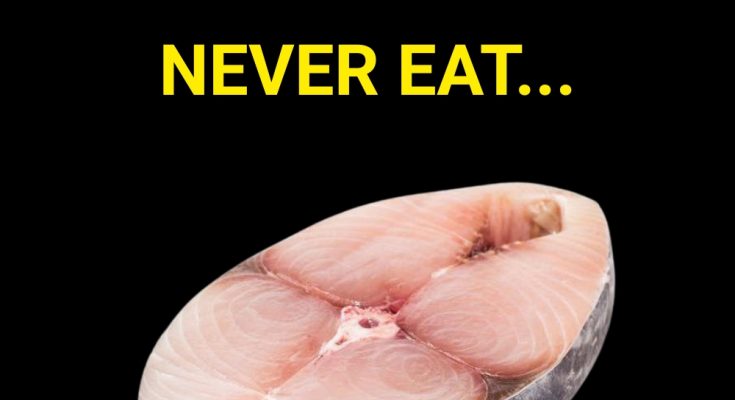
Fish can be an excellent part of a healthy diet, providing important nutrients like omega-3 fatty acids which can lower your risk for diseases like cancer, Alzheimer’s, cardiovascular disease, and dementia, age-related macular degeneration, and rheumatoid arthritis, among others. However, there are certain fish you should never eat. Unfortunately, because of human industrial activity like coal-fired electricity generation, smelting, and the incineration of waste, large amounts of mercury are ending up in our waterways, and subsequently, the fish that swim in them. As this mercury gets into the marine food chain, it “bioaccumulates.”This means that when smaller fish get eaten by gradually larger fish, the concentration of mercury at each level becomes greater. Consuming too much mercury can be not safe to your health, and cause mercury poisoning. For this reason, the US Food and Drug Administration (FDA) and the US Environmental Protection Agency (EPA) have issued guidelines regarding how much mercury is safe for humans to ingest, and the non-profit Environmental Defense Fund (EDF), provides suggestions for which fish you shouldn’t eat.
Tilapia
Did you know that in some regards, eating tilapia is worse than eating bacon? In fact, the shift to eating more farmed fish like tilapia is leading to highly inflammatory diets, according to a 2008 study published in the Journal of the American Dietetic Association.
Wake Forest University School of Medicine researchers say tilapia is one of the most widely consumed fish in America. The problem with that? It contains very low levels of beneficial omega-3 fatty acids and, perhaps worse, very high levels of inflammatory omega-6 fatty acids.
Sustaining high levels of inflammation in the body can worsen symptoms of autoimmune disorders and may be linked to chronic conditions like heart disease, cancer and diabetes.
If you must eat this fish, avoid tilapia from China, where farming practices are particularly worrisome. Better sources are the U.S., Canada, the Netherlands, Ecuador and Peru.
Of course, wild-caught tilapia is preferable to farmed fish but is very hard to fin
- Bluefin Tuna
Highly prized in sushi, bluefin tuna is critically endangered due to decades of overfishing. Its population has plummeted, and eating it contributes directly to the species’ decline. - Chilean Sea Bass
Also known as Patagonian toothfish, this deep-sea predator is often illegally fished and slow to reproduce. Its popularity has led to unsustainable fishing practices, making it an environmentally risky choice. - Orange Roughy
This fish can live over 100 years, but it matures slowly, making it extremely vulnerable to overfishing. It’s often caught using deep-sea trawling, which damages ocean ecosystems. - Swordfish (especially imported)
Swordfish is known for having very high mercury levels, which can be harmful to the nervous system, particularly in children and pregnant women. - Shark
Shark meat contains high levels of mercury, and many species are endangered. Sharks are apex predators and crucial to marine ecosystems, so overfishing them has serious environmental impacts. - King Mackerel
This fish is also high in mercury, especially larger specimens. The FDA advises certain groups, like pregnant women and young children, to avoid it entirely. - Tilefish (from the Gulf of Mexico)
Tilefish from the Gulf is one of the most mercury-contaminated fish in U.S. waters. The FDA lists it as a “do not eat” species for at-risk populations. - Atlantic Cod
Once a dietary staple, Atlantic cod has been severely overfished. Though there have been some recovery efforts, many stocks remain dangerously low. - Eel (Unagi)
Popular in Japanese cuisine, freshwater eels are critically endangered due to overfishing and habitat loss. They’re also often contaminated with pollutants due to the environments in which they’re farmed. - Grouper
Grouper are overfished in many regions, and like many large fish, they contain elevated levels of mercury. Their slow growth makes population recovery difficult. - Farmed Salmon (especially from open-net pens)
Farmed salmon can be exposed to parasites, antibiotics, and chemical-laden feed. Open-net farming also pollutes the ocean and threatens wild salmon populations. - Atlantic Flatfish (flounder, sole, halibut)
These species have been overfished and often caught using bottom trawls, which destroy seabed habitats and catch other marine life unintentionally. - Imported Catfish
Some imported catfish are raised in unsanitary conditions with unregulated antibiotic use. U.S.-farmed catfish are generally safer, but imports from some countries are less reliable. - Snapper (various types)
Snapper is often mislabeled in restaurants and stores, and some species are overfished. It’s best to verify the source or avoid it unless you’re certain of its origin.
Being an informed consumer can help protect your health and the health of our oceans. Choose sustainable seafood options and always check reliable guides like the Seafood Watch from the Monterey Bay Aquarium.



One Comment on “14 Fish You Should Consider Never Eating”